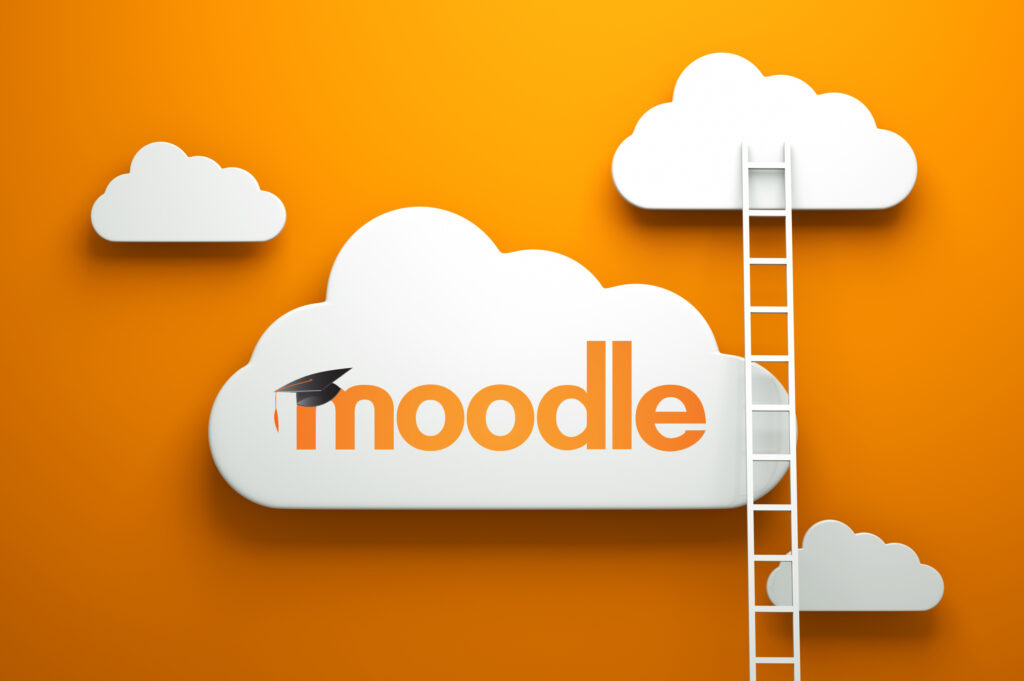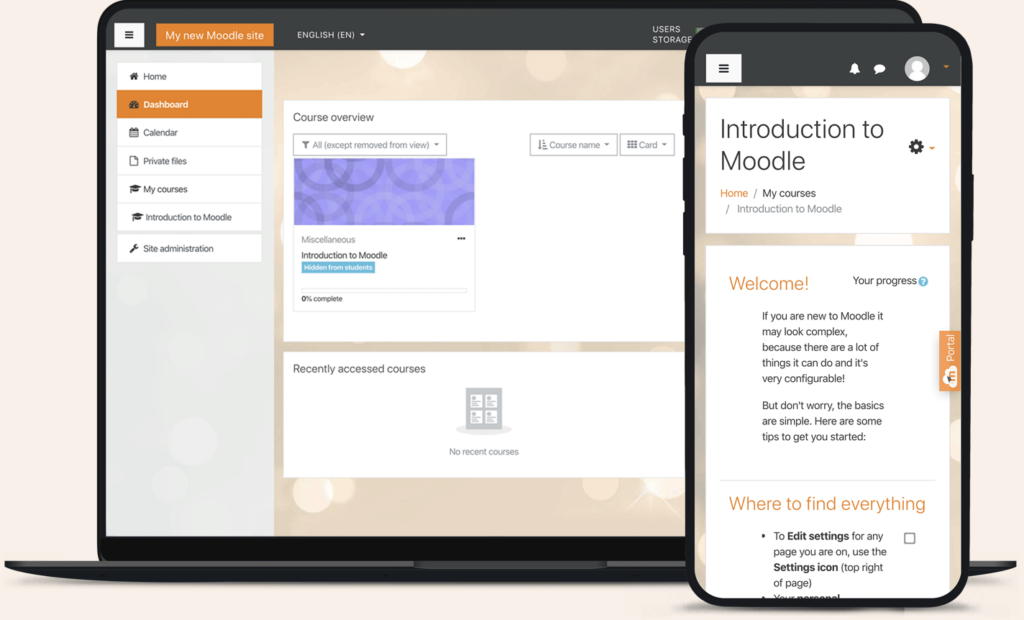Let’s share more on Moodle hosting services. Moodle is an open-source LMS for educators to create and manage online courses.
Moodle is a secure, scalable, customizable, cloud-based LMS with all the tools you need to teach and learn.
It integrates with other platforms to provide a comprehensive learning experience and promotes self-paced learning.
Why choose Moodle?
- It’s an open-source learning management system (LMS) that is free to use and customize. Its active community of developers constantly updates it with new features, functionality, and security fixes.
- Moodle offers an extensive list of features that cater to the diverse needs of educators and learners. The modular platform lets educators customize courses with plugins and extensions to fit their teaching methods.
- Very adaptable to various educational contexts, from traditional academic settings to corporate training and vocational programs.
- Moodle’s interface is intuitive and easy to navigate. It’s accessible to educators and learners with varying levels of technological proficiency.
- It has a large, supportive community of users who can help you with anything.
- Also, Moodle is a very secure platform with a variety of security measures. It is also a reliable platform backed by many developers and users.
- Moodle is a collaborative platform allowing learners to interact with each other and instructors. It creates a more engaging and interactive learning experience.
Understanding Moodle Hosting:
Moodle hosting offers specialized servers and services to optimize Moodle’s performance. They include:
- Hosting: A reliable and secure SaaS cloud service with maintenance, backups, and upgrades included. You choose your level of support.
- Hybrid Hosting: Designed for organizations that want more control over their Amazon Web Services account for security, policy, or continuity reasons. Use what you need, and pay for what you use with their hybrid hosting approach.
- Self-hosting: They assist organizations with infrastructure design, site configuration, performance tuning, scaling, maintenance, backups, and upgrades.
Benefits of Moodle hosting services
- Optimum security and customer support: It prioritizes security with robust measures against threats and breaches. They offer reliable customer support to resolve technical issues quickly, minimizing disruption to learning.
- Regular updates for better performance: Moodle updates its software to the latest versions and security patches. These updates improve the platform’s performance and add new features for a smooth and up-to-date learning experience.
- Concise service agreement on security features: Offers clear service agreements on security, including data encryption, SSL certificates, password protection, and privacy compliance.
- Hassle-free and easy-to-use experience: Moodle has a user-friendly experience for all. They handle technical aspects so that educators can focus on content and delivery.
- Fast and affordable hosting: With Moodle hosting, get optimized servers for fast courses and a seamless learning experience. Affordable plans make it accessible to educational institutions and organizations.
- Scalable, reliable, and resilient solutions: Get scalable solutions that accommodate increasing users and courses without compromising performance. The hosting infrastructure is reliable and resilient to ensure uninterrupted access to the learning platform.
- Enhanced security and data protection: They have implemented robust security measures to protect data. Regular data backups are performed to ensure data integrity and minimize the risk of data loss.
9 Factors to consider when choosing a Moodle hosting provider:
- Security Measures: Choose a hosting provider with robust security measures to protect your Moodle site and data. Check for data encryption, SSL certificates, regular backups, and proactive security updates.
- Customer Support: Choose a hosting provider with reliable and responsive customer support. Ensure they have good technical support to minimize downtime and disruptions in learning.
- Uptime Guarantee: A high uptime percentage is essential for Moodle site accessibility. Look for a hosting provider that offers a solid uptime guarantee, ideally with 99.9% uptime or higher.
- Performance and Speed: Fast loading and quick response are key to a good user experience. Ensure the hosting provider has a robust infrastructure and optimized server configuration to deliver high performance and speed.
- Scalability: Consider the hosting provider’s ability to accommodate growth. The hosting solution should scale with user and course growth without impacting performance.
- Data backup and recovery: Data loss can harm the learning process. Choose a hosting provider with reliable data backup and recovery.
- Server location: Choose a hosting provider with servers in strategic locations to improve loading speed for your target audience.
- Pricing and plans: Compare hosting provider’s prices and features. Choose a hosting plan that fits your institution’s needs and budget, with transparent pricing and no hidden fees.
- Reputation and reviews: Check customer reviews and testimonials to research a hosting provider’s reputation. Positive feedback from other educational institutions indicates a reliable hosting service.
Best alternatives for Moodle hosting:
- Canvas by Instructure
Canvas is a popular cloud-based LMS that is a user-friendly interface and extensive features.
It offers reliable hosting solutions with excellent performance, scalability, and security. Canvas is widely used in K-12 schools, higher education institutions, and corporate training environments.
- Blackboard Learn
Blackboard Learn is another well-established LMS hosting service for various educational institutions.
It offers comprehensive tools for course creation, assessment, collaboration, and communication.
- Google Classroom
Google Classroom is a user-friendly LMS integrated with Google Workspace. It is more suitable for K-12 schools and smaller educational setups.
Its seamless integration with Google’s suite of productivity tools makes it a compelling choice for many educators.
- D2L Brightspace
D2L Brightspace is a cloud-based LMS that is secure and has the ability to support large numbers of users.
It is a good choice for organizations that need a reliable and scalable LMS.
- LearnDash
LearnDash is a self-hosted LMS known for its powerful features and ability to be integrated with other WordPress plugins.
It is a good choice for organizations that want an LMS that they can own and customize to their specific needs.
Summing up;
Moodle hosting offers robust security, regular updates, a concise security agreement, and an easy-to-use experience.
Moodle’s fast, affordable, scalable, reliable solutions, enhanced security, and key features help educators create dynamic, effective online learning experiences.
Flexible and innovative Moodle hosting options accommodate different educational contexts and requirements.
Moodle is a versatile LMS with open-source code, extensive features, and a supportive community.
Partnering with a good hosting provider can enhance security, support, scalability, and reliability.






